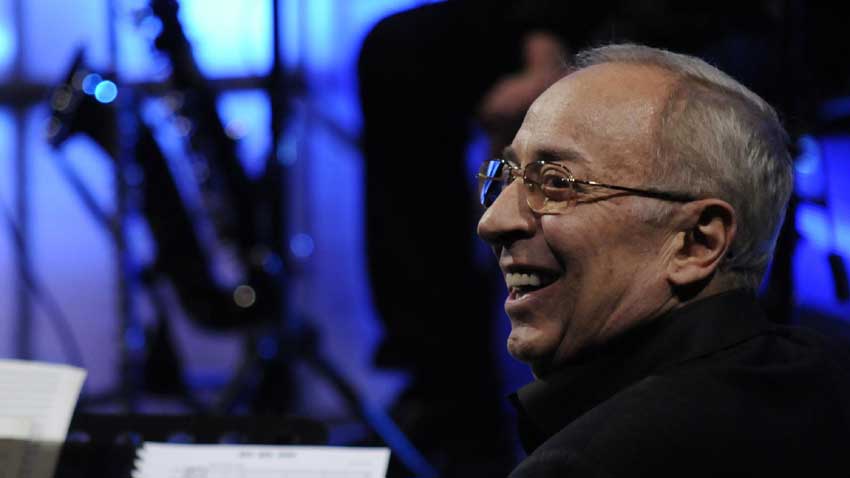Villy’s Hooter – a radio show that was aired just 10 times but has gone down in history as the only musical radio reality show – was launched on 22 March 1973 at the Bulgarian National Radio’s concert studio. The idea for the show belongs to Katya Vodenicharova, editor-in-chief of the “Humour, satire, entertainment” department.
“Villy’s Hooter coincided with a time when many people wanted to become singers, to have a musical career, to make big money,” she says. “We had a jury of musicians, composers, journalists, writers, actors, chaired by Villy Kazasyan. The moment he heard a false note, he would blow an old carriage hooter. After we aired an invitation, on the day set parents from all over Bulgaria and their talented children flocked to the National Radio – the lobby and the courtyard were literally crammed with people. We had to call in the mounted police to establish order. We divided the people up in groups, scheduled auditions and a demonstration of “talents” began – comical but sad. The press gave a lot of coverage to the competition, the effect was huge.”
Here now is a young girl who was interrupted by the hooter thirty seconds after she had started singing. The recording is from the BNR’s Golden Fund audio archives:
Unlike the TV reality shows, Villy’s Hooter was not in fact a competition as such. The media called it a “radio phenomenon” and a “genuine show”. Satirist Boris Arnaudov, editor at the BNR for many years and a member of the Hooter team remembers:
 “The show was simply meant to entertain – after all we were not from the musical department but from “Humour, satire, entertainment”. Of course we wanted to give talented people a chance to show what they are capable of. We had a script but we also relied heavily on Villy Kazasyan’s improvisations – his was the leading role in the show. Each member of the jury would give his or her opinion, the main aim being to damp the pop-music mania that was so widespread at the time with people wanting to imitate pop singers in all things. We organized 10 contests, unfortunately of them only one has been preserved in our audio archives. Several kids who had graduated the conservatory came, whose talent was beyond any doubt and they took part in a concert. Villy Kazasyan was a very generous person. He was able to appraise their performance himself and invited them to the BNR Big Band as soloists. Years later such shows are being done with much more money and probably effort, but we are proud to say we were the first.”
“The show was simply meant to entertain – after all we were not from the musical department but from “Humour, satire, entertainment”. Of course we wanted to give talented people a chance to show what they are capable of. We had a script but we also relied heavily on Villy Kazasyan’s improvisations – his was the leading role in the show. Each member of the jury would give his or her opinion, the main aim being to damp the pop-music mania that was so widespread at the time with people wanting to imitate pop singers in all things. We organized 10 contests, unfortunately of them only one has been preserved in our audio archives. Several kids who had graduated the conservatory came, whose talent was beyond any doubt and they took part in a concert. Villy Kazasyan was a very generous person. He was able to appraise their performance himself and invited them to the BNR Big Band as soloists. Years later such shows are being done with much more money and probably effort, but we are proud to say we were the first.”
Here are some of the comments the jury members made: “Strange as it may sound, singing is something that can be learnt,” “Lacking in expression, drab singing, no vocal capacity, no rhythm, no life – the performance is meant to touch people”. Said with a sense of humour, their evaluation of the singers’ performances was objective. One more Golden Fund recording – Radka from Plovdiv. The lyrics to the song she sings - Love of a Roamer are her own:
Villy’s Hooter became very popular. It was broadcast until the end of 1974 and was then dropped, the explanation being that the idea had run its course. The grand finale came with a concert at the BNR’s concert studio with the participation of a dozen of the best performing participants. One of them was singer Maya Neshkova:
“I had already started singing and one day my father told me about the competition. I remember I sang the song “Prayer” from the repertoire of Borislav Gruncharov. Emotions really ran high. The concert was in the BNR’s Studio No. 1 with the Big Band conducted by Villy Kazasyan, a figure who has left a lasting mark on my own career. Amateur arts were really big back then, but Villy’s Hooter was an opportunity to meet renowned musicians and to make your choice of career.”
English version: Milena Daynova
On 25 January, 1935, Tsar Boris III signed the decree by force of which the Bulgarian National Radio was created. The man appointed head of broadcasting and first director of Radio Sofia, as it was then called, was Panayot Todorov..
“I am not at all fond of the word “legend”, I am a down-to-earth person and an artist. But if I would have to say something about it, it would be “I was recognized as the best basso cantabile in the world.” These words are from one..
2013 went down in the most modern history of Bulgaria as the year of protest. It was the protests that brought down the first GERB cabinet of PM Boyko Borissov, while the term of office of the bipartisan Bulgarian Socialist Party-Movement..

+359 2 9336 661
